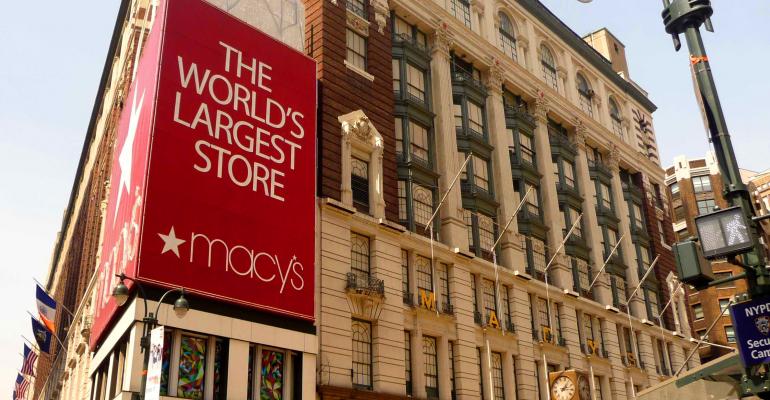It’s a familiar story: A fund looking for a windfall crunches the numbers, decides that a company has loads of cash tied up in real estate, starts buying up shares in said company and pressures it into monetizing its bricks-and-mortar assets.
According to various reports, Macy’s Inc. is the latest company to receive pressure from investors to do a sale-leaseback. Several hedge funds have recently acquired stakes in the department store chain including Greenlight Capital Inc., which bought 1.7 million shares in the first quarter. Well-known activist investor Jana Partners LLC also grabbed a stake in Macy’s earlier this year.
During Macy’s first quarter conference call, Morgan Stanley & Co. analyst Kimberly Conroy Greenberger said that the question the firm has received most frequently from investors involves the chain’s real estate strategy. She asked Macy’s CFO Karen M. Hoguetto to articulate how the company is thinking about its real estate as an asset and if it is contemplating any sort of strategy around the value of its real estate.
Hoguet was quick to point out that evaluating real estate is “far more complicated than what most people think. And some of the estimates of value in our real estate, I think, have been done overly simplistically.”
According to its last annual report, Macy’s real estate has a book value of $7.8 billion. The chain owns 447 of its 823 stores, as well as several offices, according to financial filings.
Hoguet added that Macy’s is working with its banking partners to formulate the best strategy for its real estate. “Our objective is always to maximize value. And up until now, we haven't seen an opportunity that made sense in terms of a global strategy,” she said.
Unlocking value
Macy’s certainly isn’t the only retailer to be questioned about its real estate. In fact, it’s a common question for companies in every sector, according to Glenn Brill, managing director in FTI’s Real Estate Solutions practice.
“The fundamental question for all companies is why they own real estate when it’s not their core business,” Brill notes. “Companies that own real estate have a tremendous amount of capital tied up in it, and it tends to shrink your balance sheet. By selling it, you have the potential to unlock the value to distribute to shareholders or reinvest.”
However, Brill points out that when people talk about the “value” of real estate, it can mean different things. “There’s the market value of the real estate, and then there’s also what the real estate is worth to Macy’s,” he explains. “Macy’s looks at its real estate from a long-term operating perspective, while investors look at the real estate as an asset. Hedge funds in particular aren’t interested in long-term investing. They want the return now.”
Macy’s has monetized select pieces of real estate over the past couple of years, selling two stores in Northern California to Sand Hill Property Co. The real estate firm bought Macy’s 177,000-sq.-ft. store in Sunnyvale Town Center in Sunnyvale for $40 million and acquired the Macy’s store in Vallco Shopping Mall in Cupertino as part of a larger redevelopment plan. It also acquired JC Penney and Sears stores, both of which will be closing later this year.
“We did take advantage of a disconnect between the value of real estate and the value of the retail entity,” Hoguet noted. “And we are continuing to study many opportunities like that within the portfolio. So I would say obviously we’re studying everything, and if something would make sense, we obviously would do it.”
Macy’s best-known asset is its flagship Herald Square location in New York. The store is one of the city’s top tourist attractions, and the building was added to the National Register of Historic Places as a National Historic Landmark in 1978.
Maximizing the proceeds
Brill points out that it’s generally cheaper to own real estate than to rent it, but that simple math doesn’t take into account how the proceeds from a real estate monetization could be used. “The argument could be made that the money would provide a better ROI if it was invested in the business itself,” he says.
Macy’s has lagged the broader S&P Retail index over the past 12 months, but only by a bit. Its shares have risen around 11 percent during that period, and the chain increased its dividend during the first quarter to 36 cents, a boost of 15 percent. Also during the quarter, the company increased its share repurchase program by $1.5 billion, and it recently announced plans to roll out an off-price concept called Macy’s Backstage.
Other department stores have recently announced big changes to their real estate strategies. Sears Holdings Corp. plans to spin off 254 stores into a REIT, and Hudson Bay Co., the parent of parent of Lord and Taylor and Saks Inc., has formed real estate joint ventures with RioCan Real Estate Investment Trust and Simon Property Group to monetize the department store’s real estate to pay down debt.

